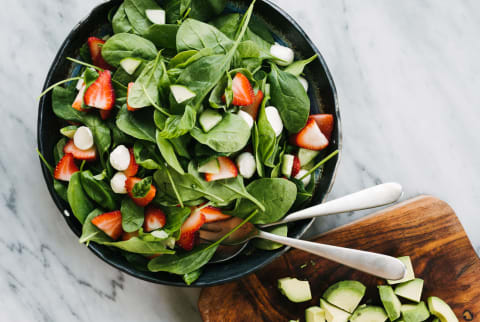Advertisement
Ever Go Through Stages When You're Hungry ALL The Time? Here's Exactly What To Do


Whether it's due to hormonal fluctuations, changes in the seasons, shifts in the microbiome, or a concerted effort to snack less and maintain a healthier weight, we all go through periods of time when we're hungry—all. the. time.
And it can be an internal debate: Should you give in or not? It's never a good idea to restrict yourself, mostly because it can end up leading to bingeing. But it can also be hard to see what, exactly, is leading to this insatiable hunger. Why don't you feel satisfied?
Diets don't typically work, and ultimately, there are better ways to curb your appetite—especially your cravings for sugar and carbohydrates—and maintain your happy weight. The trick? Eating nutrient-dense foods that send signals to your brain that you are satisfied.
So if you've already eaten a healthy meal and you're still wanting to raid the pantry, try one or a few of these 10 tips:
1. Eat more fish.
Fish1 is loaded with high-quality protein and omega-3 fatty acids, both of which increase feelings of fullness and satiety. Some studies2 even suggest that the protein in fish has one of the strongest effects on satiety compared to all other proteins. Worried about sustainability? These are the healthiest fish for you and the planet.
2. Enjoy other proteins.
Studies3 show that adding a high-quality protein to your meal improves satiety. My favorite protein choices are fish (of course!), lean meats, and eggs. This is especially relevant for your first meal of the day. According to science4, eating eggs and a meat protein for breakfast will make you feel more satiated for the whole day.
3. Fill up with grains.
Foods that are high in fiber are also helpful in improving satisfaction levels while decreasing hunger. Quinoa is a great source of protein and is high in fiber. Oats and buckwheat, which have also been shown to improve satiety5, are two other great options.

4. Eat more greens.
According to at least one study6, eating a good amount of vegetables (like a salad) prior to a meal can increase satiety and lead to reduced food intake. Green plants like spinach7 are rich in thylakoids that reduce hunger, increase satiety, and reduce cravings. This is a great excuse to start your meal with Chrissy Teigen's dreamy fall salad recipe.
5. Munch on legumes.
Legumes, which include lentils, beans, green beans, peas (and snap peas), chickpeas, and peanuts, are a great source of protein and loaded with fiber. A large systematic review8 (meaning a study that looks at all previous studies on the topic) done in 2014 showed that eating foods like these contributes to satiety.
6. Add a variety of nuts.
If you're standing there staring at your snack drawer, try reaching for a handful of nuts. Nuts9 like walnuts and almonds have a high satiety value, likely due to their high content of protein and healthy fats. Almonds10 improve satiety, while pine nuts11 have also been shown to work as an appetite suppressant.
7. Feed yourself healthy fats.
If can be tempting to avoid fats if you're trying to maintain your weight, but adding fats like avocado, coconut products, sunflower oil, palm kernel oil, safflower oil, extra-virgin olive oil, sesame oil, and the omega-3 oils that you can get from fish will help you feel more full and satisfied—while also boosting your metabolism and energy. Adding avocado12 to a meal, for instance, was found to significantly improve satiety for a three- to five-hour period. A good general rule is to not skimp on fats; just make sure you're eating the healthiest ones possible.
8. Enjoy a little fruit.
Fruits like watermelon, oranges, blueberries, apples, and rhubarb are high in fiber and are loaded with vitamins, minerals, antioxidants, and often water, making them a good choice when you're looking to enhance satiety. Whole fruit13 is better than fruit juices, as the latter are primarily sugar and cause a higher insulin spike and less satiety.
9. Use a small plate.
This one might seem a little bit old-school, but if you're struggling with perpetual hunger, try using a smaller plate and filling it up to the max. When you do this, your brain feels like food is plentiful. In fact, a 2005 study showed that we apparently count calories with our eyes, not our stomachs.
10. Eat mindfully.
You've heard this before, but I'm here to tell you that turning off the TV and eating mindfully is a scientifically backed way to reduce feelings of hunger. Take your time eating. Enjoy the aromas, the colors on your plate, the flavors in your mouth, and the texture as you chew. Chew slowly and many times. Savor the experience. Studies14 even show that mindful eating may help individuals overcome compulsive eating and promote healthier eating behaviors15.
15 Sources
- https://www.ncbi.nlm.nih.gov/pubmed/18602429
- https://www.ncbi.nlm.nih.gov/pubmed/1542005
- https://www.ncbi.nlm.nih.gov/pubmed/2228407
- https://www.ncbi.nlm.nih.gov/pubmed/23446906
- https://www.ncbi.nlm.nih.gov/pubmed/16277791
- https://www.ncbi.nlm.nih.gov/pubmed/15389416
- https://www.ncbi.nlm.nih.gov/pubmed/25895695
- https://www.ncbi.nlm.nih.gov/pubmed/24820437
- https://www.ncbi.nlm.nih.gov/pubmed/24920033
- https://www.ncbi.nlm.nih.gov/pubmed/25182142
- https://www.ncbi.nlm.nih.gov/pubmed/?term=pine+nuts+and+satiety
- https://www.ncbi.nlm.nih.gov/pubmed/24279738
- https://www.ncbi.nlm.nih.gov/pubmed/6259919
- https://www.nature.com/articles/s41598-018-24001-1
- https://www.sciencedirect.com/science/article/pii/S0191886914002396


















